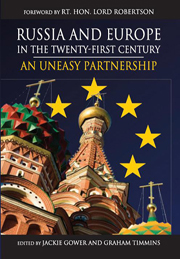Book contents
- Frontmatter
- Contents
- List of Contributors
- Acknowledgements
- List of Abbreviations/Acronyms
- Foreword Russia and Europe
- Preface
- Introduction Russia and Europe: What Kind of Partnership?
- PART 1 Russia looking West
- PART 2 Europe looking East
- Chapter 7 The European Union's Policy on Russia: Rhetoric or Reality?
- Chapter 8 The Role of Norms and Values in the European Union's Russia Policy
- Chapter 9 NATO and Russia: Progress or Process?
- Chapter 10 German-Russian Bilateral Relations and EU Policy on Russia: Reconciling the Two-Level Game?
- Chapter 11 Shortcut to Great Power: France and Russia in Pursuit of Multipolarity
- Chapter 12 A Europe Divided by Russia?: The New Eastern Member States and the EU's Policy towards the East
- PART 3 Partnership in Practice
- Conclusion Russia and Europe: An Uneasy Partnership 289
- Index
- More Titles in this series
Chapter 12 - A Europe Divided by Russia?: The New Eastern Member States and the EU's Policy towards the East
from PART 2 - Europe looking East
Published online by Cambridge University Press: 05 March 2012
- Frontmatter
- Contents
- List of Contributors
- Acknowledgements
- List of Abbreviations/Acronyms
- Foreword Russia and Europe
- Preface
- Introduction Russia and Europe: What Kind of Partnership?
- PART 1 Russia looking West
- PART 2 Europe looking East
- Chapter 7 The European Union's Policy on Russia: Rhetoric or Reality?
- Chapter 8 The Role of Norms and Values in the European Union's Russia Policy
- Chapter 9 NATO and Russia: Progress or Process?
- Chapter 10 German-Russian Bilateral Relations and EU Policy on Russia: Reconciling the Two-Level Game?
- Chapter 11 Shortcut to Great Power: France and Russia in Pursuit of Multipolarity
- Chapter 12 A Europe Divided by Russia?: The New Eastern Member States and the EU's Policy towards the East
- PART 3 Partnership in Practice
- Conclusion Russia and Europe: An Uneasy Partnership 289
- Index
- More Titles in this series
Summary
Introduction
Nowhere else is the impact of the Eastern enlargement on the European Union (EU)' s foreign and security policy felt as strongly as in relations with Russia and the other Eastern neighbours of the Union. On the eve of enlargement, it was the Atlanticism of the incoming member states that caused most concern among many old EU countries. However, the fear that the new member states would act as ‘ Trojan horses of the US and put a brake on the development of the European foreign, security and defence policy seems to have been unfounded. The same cannot be said about another major concern of the old member states: they were right to assume that the new Eastern members were going to complicate relations between the EU and Russia by bringing the burden of history and their own problems in relations with the Eastern neighbour to the Union’ s table. The new member states on their behalf were hoping that EU membership would have a positive impact on their relations with Russia. They had also been expecting the EU to move towards a more unified and consistent Russia policy. Yet neither Russia nor the EU have lived up to their expectations: during the first one-and-a-half years of EU membership, (the time covered by this chapter), their relations with Russia developed in a negative rather than positive direction, and the EU still lacks a coherent policy towards Russia that would help to address the concerns of its Eastern members.
- Type
- Chapter
- Information
- Russia and Europe in the Twenty-First CenturyAn Uneasy Partnership, pp. 207 - 226Publisher: Anthem PressPrint publication year: 2007
- 4
- Cited by

